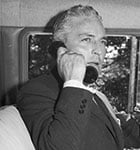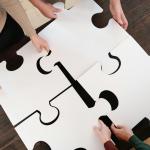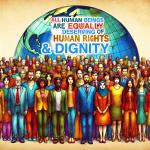 Trouble called again last Thursday night. The number illuminated in the landline phone’s small window. Mother. She’s eighty-four now. Father’s eighty-seven. They sold their house—where we lived when I was in in high school—about twenty-five years ago. Moved into a condo. They’re still living in the condo, independently.
Trouble called again last Thursday night. The number illuminated in the landline phone’s small window. Mother. She’s eighty-four now. Father’s eighty-seven. They sold their house—where we lived when I was in in high school—about twenty-five years ago. Moved into a condo. They’re still living in the condo, independently.
A few nights earlier, during one of my routine every-other-day-or-so phone calls with her, Mom told me that Dad had a cold. He’d spent most of the day sleeping.
Dad’s a big guy, height and girth, though his impressive belly has deflated considerably over the last few years: a few hospitalizations, a diminished appetite. Though he doesn’t complain about it, he suffers from painful arthritis. With a cane, which he uses reluctantly, he shuffles around the condo, and inches his way from condo to car to restaurant to cardiologist to condo to couch for TV. He hardly has the strength to push himself up from the sofa. Gravity is calling him home.
Mom’s healthy. A few years ago, she seemed to begin her decline: hearing, memory, understanding. Then trouble came to her kids.
In her youngest son’s family, his wife’s cancer woke up from its slumber, rested and ready to finish its job. In quick succession: the daughter-in-law’s death, one son’s graduation from high school, the other’s graduation from middle school, and then a celebration of her life. The next day my youngest brother, and his two boys started writing a new chapter of their lives.
Mom’s other son (my middle brother) had his own challenges in recent years. The company for which he had worked for many years with great success as an independent contractor was bought by a larger corporation. Restructuring. Job cuts. In his department, my brother, was among the last standing. A testament to his talent, intelligence, discipline, drive. He was indispensable.
But, to stay with the new company, there was a price to be paid. He had to give up some of his independence and sign on as a corporate employee. Then he and his family moved from the beautiful house he had built and lived in for many years to a new house, equally beautiful, I’m told, but farther away from where we grew up, to a land of lower property taxes.
I, too, lived with my own challenges in recent years: prostate cancer, porcelain gallbladder, hearing loss.
But rather than wearing her out, our troubles seem to have animated Mom. Stimulated her fortitude. Sharpened her mind.
It had to be Dad. That’s why she was calling.
I had to be prepared. I had to be strong.
Between the first and the second ring, five seconds. Between the second and third ring, five seconds. In those brief intervals, all of this came up. Not necessarily in the form of all these words. Some words, yes, along with images, and sensation of nerves, muscles, bones, breath—the whole system activated by a few ring tones, which, coming from that number at that time of day, on that day of the week, sounded to me like an alarm.
What trouble is coming toward me now? What trouble is already in the air, the wires, the receiver waiting to deliver itself unto me? What chaos, what accident, what loss?
Sometimes the trigger of fear is mundane: a generic, old-school, landline ringtone. Was it chosen, designed, composed as a measure or two of, say, minimalist music? If it’s art, art in miniature, does it express feeling and thought?
Brian Eno, one of my favorite artists, created the Windows 95 start-up sound. In an interview, Eno recalls receiving the commission from Windows executives: “The thing from the agency said, ‘We want a piece of music that is inspiring, universal, blah-blah, da-da-da, optimistic, futuristic, sentimental, emotional,’ this whole list of adjectives, and then at the bottom it said ‘and it must be 3.25 seconds long.’”
My landline’s ringtone: a single pitch, repeated twelve times in rapid succession, followed by a brief silence before the tone sounded again. From my study, I called my home number and listened to the phone ring. As I listen now, I find the sound to be neither inspiring nor emotional: a neutral sound.
There wasn’t anything especially noticeable about the ringtone the night mother called either. But my reaction to seeing who was calling: that was noticeable and memorable, though, honestly, if I hadn’t chosen to write about those few seconds between seeing who was calling and my answering the phone, the intensity, speed, and significance of my reaction would have just sunk back down into the darkness of the heart from which it had, for a moment, risen.
Writing illuminates fear. In this case, a flash of fear I felt for my family, myself.
But, as if that weren’t enough, there was, I see now, more to the fear I experienced that night. It was personal, but it was also a basic human response to a close encounter with the limits of my ability to protect and control my life and the lives of those I love.
How much effort, how much ingenuity, how much money do we invest in creating and sustaining an illusion that we are in control—of our lives, of the lives of others? How many words do we compose, how much technology do we design and employ to keep the story going—the story that our lives and the lives of those we love will go on, go on, go on in the ways we want them to and as long as we need them to, as long as we want them to?
Though I don’t know how—maybe it’s the years of meditation practice, maybe it’s perspective one may gain with age—after the third ring of the phone, I let the fear, the racing heart and mind, for a moment, go.
Then, with open ears and open heart, I picked up the phone and said: “Hey, Mom! What’s up?”
Richard Chess is the author of three books of poetry,Tekiah, Chair in the Desert, and Third Temple. Poems of his have appeared in Telling and Remembering: A Century of American Jewish Poetry, Bearing the Mystery: Twenty Years of IMAGE, and Best Spiritual Writing 2005. He is the Roy Carroll Professor of Honors Arts and Sciences at the University of North Carolina at Asheville. He is also the director of UNC Asheville’s Center for Jewish Studies.















